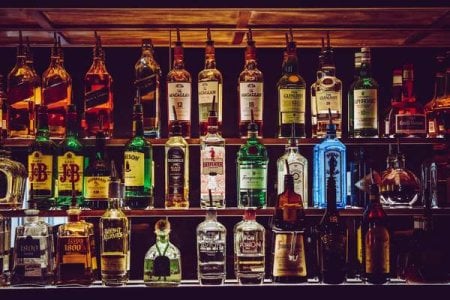Warning: Your Favourite Vacation Cocktail Could Contain This Dangerous Chemical! Find Out Why
By
Danielle F.
- Replies 0
Vacations are a time for relaxation and enjoyment, often accompanied by a refreshing cocktail or two. But what if the very drink you're sipping on could pose a serious health risk? This is the alarming reality for some travellers who have encountered methanol in their beverages, leading to tragic consequences.
Recently, the dangers of methanol poisoning have come to light following the heartbreaking story of a father's call to action after the poisoning death of his daughter. The young woman was one of several tourists who tragically passed away after consuming tainted alcohol in Laos. These incidents have raised important questions about methanol, its presence in drinks, and how to avoid it.
Methanol, also known as wood alcohol, is a chemical that's used industrially as a fuel and in products like antifreeze and solvents. It's a byproduct of wood distillation and is not intended for human consumption. The reason for this is clear: methanol is highly toxic. Even small amounts can be lethal without prompt medical intervention. Symptoms of methanol poisoning include headaches, dizziness, nausea, vomiting, blurred vision, and can escalate to seizures, coma, or even death.
So why might methanol be found in your vacation cocktail? Unscrupulous bars and vendors have been known to add methanol to alcoholic drinks to increase their potency and save money on ethanol-based spirits, which are safe to consume. This dangerous practice is not limited to any one region but can occur anywhere, especially where the cost or taxes on legitimate alcohol are high.
The risk is particularly acute with homemade spirits or in regions with less stringent controls over alcohol production. In some cases, methanol can inadvertently end up in the final product during the distillation process, especially in home-brew setups common in poorer countries.
To protect yourself from methanol poisoning, it's crucial to be vigilant about where you get your drinks. Here are some tips to keep in mind:
The Methanol Institute also suggests that duty-free products are generally safer choices, as they are subject to more rigorous quality controls.
It's important to remember that methanol is colourless, odourless, and tasteless, making it difficult to detect in a drink. If you suspect that you or someone else has consumed methanol, it's critical to seek medical attention immediately. Early treatment is key to a successful recovery.
As we look forward to our next holiday, let's ensure that our health and safety remain a top priority. By being informed and cautious about what we drink, we can avoid the dangers of methanol and enjoy our vacations to the fullest.

Have you ever had a close call with a suspicious drink while traveling? Share your experiences and tips with our community in the comments below. Let's help each other stay safe and informed!
Recently, the dangers of methanol poisoning have come to light following the heartbreaking story of a father's call to action after the poisoning death of his daughter. The young woman was one of several tourists who tragically passed away after consuming tainted alcohol in Laos. These incidents have raised important questions about methanol, its presence in drinks, and how to avoid it.
Methanol, also known as wood alcohol, is a chemical that's used industrially as a fuel and in products like antifreeze and solvents. It's a byproduct of wood distillation and is not intended for human consumption. The reason for this is clear: methanol is highly toxic. Even small amounts can be lethal without prompt medical intervention. Symptoms of methanol poisoning include headaches, dizziness, nausea, vomiting, blurred vision, and can escalate to seizures, coma, or even death.
So why might methanol be found in your vacation cocktail? Unscrupulous bars and vendors have been known to add methanol to alcoholic drinks to increase their potency and save money on ethanol-based spirits, which are safe to consume. This dangerous practice is not limited to any one region but can occur anywhere, especially where the cost or taxes on legitimate alcohol are high.
The risk is particularly acute with homemade spirits or in regions with less stringent controls over alcohol production. In some cases, methanol can inadvertently end up in the final product during the distillation process, especially in home-brew setups common in poorer countries.
To protect yourself from methanol poisoning, it's crucial to be vigilant about where you get your drinks. Here are some tips to keep in mind:
- Stick to licensed liquor stores and reputable bars or hotels when purchasing alcoholic beverages.
- Always check that the bottle seal is intact and that labels are of high quality without misspellings.
- Avoid homemade brews or spirits, as these are more likely to contain methanol.
- Be cautious of free drinks or those priced significantly lower than expected, as they may be adulterated.
- Opt for canned or bottled beer, cider, wine, and pre-mixed drinks from known brands, as these are less likely to be tampered with.
The Methanol Institute also suggests that duty-free products are generally safer choices, as they are subject to more rigorous quality controls.
It's important to remember that methanol is colourless, odourless, and tasteless, making it difficult to detect in a drink. If you suspect that you or someone else has consumed methanol, it's critical to seek medical attention immediately. Early treatment is key to a successful recovery.
As we look forward to our next holiday, let's ensure that our health and safety remain a top priority. By being informed and cautious about what we drink, we can avoid the dangers of methanol and enjoy our vacations to the fullest.
Key Takeaways
- Multiple tourists including two Australians, a British woman, an American man, and two Danes died from suspected methanol poisoning after consuming tainted alcohol in Laos.
- Methanol is a toxic form of alcohol often found in fuel, antifreeze, and solvents, and can be fatal if ingested in quantities as small as 25 to 90 millilitres without prompt medical treatment.
- The practice of adding methanol to drinks is not exclusive to any region but occurs worldwide where there is a financial incentive to substitute ethanol with cheaper methanol.
- To avoid methanol poisoning, individuals should buy beverages from reputable sources, check bottle seals and labels, and be cautious of homemade brews and drinks offered at significantly lower prices than usual.
Have you ever had a close call with a suspicious drink while traveling? Share your experiences and tips with our community in the comments below. Let's help each other stay safe and informed!









